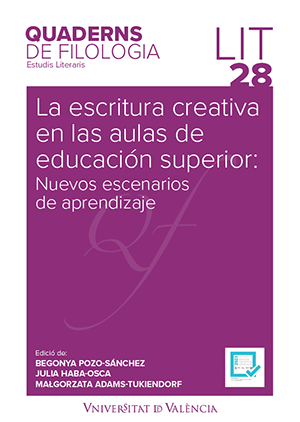L'escriptura creativa a les aules d'educació superior: nous escenaris d'aprenentatge
DOI:
https://doi.org/10.7203/qdfed.28.27958Paraules clau:
escriptura creativa, educació superior Resum
Resum
El present volum de Quaderns de Filologia – Estudis literaris (2023) pretén donar compte de la importància que progressivament ha anat adquirint l'escriptura creativa dins de l'espai d'educació superior en diferents disciplines, així com en nombroses universitats tant nacionals com estrangeres. El fet d'abordar al llarg d'estes pàgines diferents qüestions relacionades amb els processos d'aprenentatge vehiculats a través de les eines que proporciona l'escriptura creativa a l'aula, permet a qui s'acoste a estos textos ser partícip tant de la seua evolució com de la seua implantació en diferents àmbits de coneixement i també en diversos nivells.
 Descàrregues
Descàrregues
Descàrregues
Publicades
Com citar
-
Resum356
-
PDF (Español)425
Número
Secció
Llicència
 Este obra está bajo una licencia de Creative Commons Reconocimiento-NoComercial-SinObraDerivada 4.0 Internacional.
Este obra está bajo una licencia de Creative Commons Reconocimiento-NoComercial-SinObraDerivada 4.0 Internacional.
Tots els documents inclosos a OJS són d'accés lliure i propietat dels seus autors i/o institucions editores, i per tant, qualsevol acte de reproducció, comercialització, comunicació pública o transformació total o parcial necessita el consentiment exprés i escrit d'aquests.
________
Authors who publish with this journal agree to the following terms:
- Authors retain copyright and grant the journal right of first publication with the work simultaneously licensed under a Creative Commons Attribution License that allows others to share the work with an acknowledgement of the work's authorship and initial publication in this journal.
- Authors are able to enter into separate, additional contractual arrangements for the non-exclusive distribution of the journal's published version of the work (e.g., post it to an institutional repository or publish it in a book), with an acknowledgement of its initial publication in this journal.
- Authors are permitted and encouraged to post their work online (e.g., in institutional repositories or on their website) prior to and during the submission process, as it can lead to productive exchanges, as well as earlier and greater citation of published work (See The Effect of Open Access).



